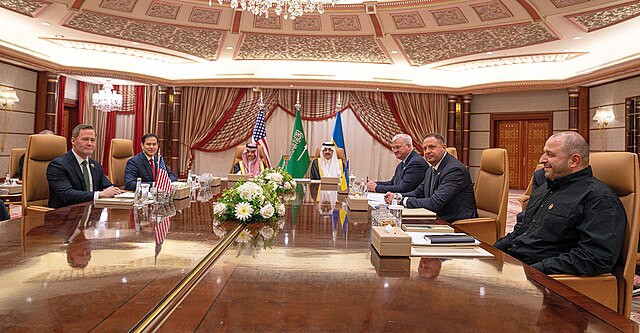High-level talks between the United States and Russia held Monday in Riyadh, Saudi Arabia, ended without a joint statement, as Kremlin officials said discussions on a limited ceasefire in Ukraine were ongoing and would remain confidential.
The negotiations, which spanned 12 hours in a luxury hotel in the Saudi capital, involved a U.S. delegation including National Security Council's Andrew Peek and State Department official Michael Anton. The Russian side was led by Grigory Karasin, chairman of the Federation Council Committee on International Affairs.
"The dialogue was detailed and complex but quite useful for us and for the Americans," Karasin told Russia's state-run TASS news agency. "We discussed numerous issues."
A ceasefire in the Black Sea region was reportedly at the center of the talks. Kremlin spokesman Dmitry Peskov told reporters Tuesday that Moscow was still reviewing the results of the meetings. "The reports made in the capital [by Russia's negotiators to the government] are being analyzed, and only then will it be possible to talk about some understandings," Peskov said.
He added that the nature of the talks would remain confidential. "The content of the technical negotiations will definitely not be 'published.' This should not be expected," Peskov said.
The talks followed a recent proposal from President Donald Trump to initiate a phased de-escalation in Ukraine, beginning with halting strikes on aerial infrastructure, followed by maritime and ground ceasefires. National Security Advisor Mike Waltz said on CBS's "Face The Nation" that a ceasefire on aerial targets took effect following Trump's phone call with Russian President Vladimir Putin.
"And then we'll talk the line of control, which is the actual front lines, and that gets into the details of verification mechanisms, peacekeeping, freezing the lines where they are. And then, of course, the broader and permanent peace," Waltz said.
While U.S. and Russian officials met Monday, Ukrainian and American negotiators held separate talks on Tuesday. A Ukrainian official told AFP that the "talks are over. All details will be announced later."
Russian Foreign Minister Sergei Lavrov said Moscow would consider a revised version of the previous Black Sea Grain Initiative, provided there were "clear guarantees" from the United States. Lavrov asserted that only an "order from Washington" could compel Ukraine to comply.
The original grain deal, brokered by Turkey and the U.N., collapsed in 2023 when Russia withdrew, accusing Western governments of obstructing its agricultural exports.
Despite these diplomatic developments, hostilities continued across the front. On Monday night into Tuesday, Ukraine's air force reported that Russia launched one missile and 139 drones. Of those, 78 were intercepted and 34 crashed without causing damage. Russia's Defense Ministry said it shot down five Ukrainian drones over Crimea.
Ukrainian President Volodymyr Zelenskyy emphasized that only sustained pressure on Moscow would lead to peace. "The war was brought from Russia and it is to Russia that the war must be pushed back," Zelenskyy wrote on social media. "They must be the ones forced into peace. They are the ones who must be pressured to ensure security."
Although Russian and American negotiators described the Riyadh talks as constructive, there was no indication that a formal agreement had been reached. Peskov reiterated that future discussions are expected but said "there are no specifics yet."




